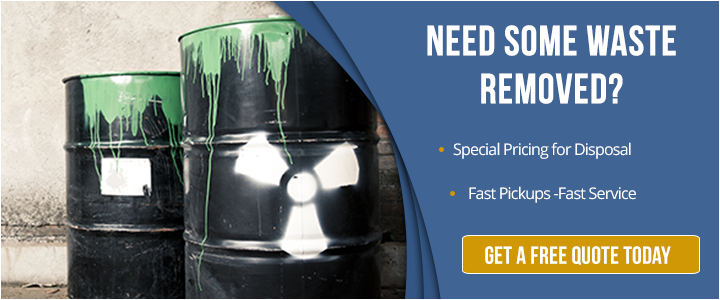Like any business, your bottom line is one of the main drivers of your success. Yet skimping on necessary services that keep your company on favorable terms with the law can be a recipe for disaster.
One of those services is hazardous waste disposal. If your business generates toxic materials or products that can endanger public health or the environment, you are required by law to dispose of those materials appropriately. While county hazardous waste disposal sites often offer a more affordable option for small businesses, the state of California imposes strict mandates on who can use them and who can’t use them.
So can your business use your county’s hazardous waste disposal program? It depends on the amount of hazardous waste you generate. And just because you can, it doesn’t mean it’s always in your company’s interest to do so. Here’s why.
County Hazardous Waste Disposal Eligibility
County hazardous waste disposal programs are largely created for residential households. Although many households may never use the same types of chemicals found in industrial settings, several types of waste should never be disposed of with municipal waste.
may never use the same types of chemicals found in industrial settings, several types of waste should never be disposed of with municipal waste.
Examples of common household hazardous waste include:
-
Aerosol cans
-
Automotive fluids
-
Batteries
-
Cleaners
- Electronic waste
-
Fluorescent lights
-
Paints
-
Pesticides
-
Propane
-
Solvents
Businesses that are generally larger generators of hazardous waste are required to follow federal and state hazardous waste laws. If your company is in an industry known for generating hazardous waste (manufacturing, laboratories, medical, pharmaceutical, construction, printing, transportation and more), you won’t likely qualify for household hazardous waste (HHW) facilities.
Instead, you will need to take your waste to the proper treatment, storage and disposal facility (TSDF). You must also follow all storage and labeling requirements, have an emergency contingency plan designed to minimize hazards, complete any manifest requirements and take any steps necessary to ensure your hazardous waste is properly disposed of at the correct facility.
There is one exception to these hazardous waste laws that allow businesses to use HHW facilities. In California, you may qualify as a Conditionally Exempt Small Quantity Generator (CESQG) in which you would be permitted to use a Household Hazardous Waste (HHW) facility. State regulations define a business as a CESQG if it generates less than:
-
27 gallons or 220 pounds of hazardous waste per month, or
-
1 quart or 2.2 pounds of acutely hazardous waste per month
This law is designed to help small businesses, non-profit organizations and other entities that may have small amounts of hazardous waste, but want or need to avoid the costs of hiring a commercial hazardous waste transportation company.
Where To Go When You Don’t Qualify For County Programs
While county hazardous waste disposal programs offer many benefits for residents and small businesses or organizations, if your company doesn’t qualify for them, you’ll need to turn to qualified disposal services to ensure your hazardous waste is properly handled.
As we mentioned above, your hazardous materials must be transported to the appropriate TSDF that will accept it. Only certain types of facilities will accept certain types of waste. For example, while one TSDF may permit contaminated soil disposal, others may only accept e-waste, medical waste or industrial waste.
If your business generates more than 27 gallons or 220 pounds per month, the only individuals who may transport your hazardous waste items to these facilities are those who hold a valid registration with the Department of Toxic Substances Control (DTSC).
Hazardous waste generators generally rely on the services of hazardous waste disposal companies in order to comply with cradle to grave requirements. Cradle to grave states that a hazardous waste generator is responsible for its waste from its initial generation through disposal. Professional hazardous waste disposal companies will ensure your waste arrives at its destination safely and according to the law.
5 Things To Look For In A Hazardous Waste Disposal Service
Hazardous waste disposal is an important component of your waste management process. Illegal disposal can have long-term ramifications for your company, which is why it’s essential to work with a trusted hazardous waste transporter.
While most companies are always concerned about their bottom line and department budgets, it’s often not best to choose the least expensive waste disposal service. In other words, never trade short-term cost savings for long-term liabilities.
When searching for the best hazardous waste disposal service for your company, here are five things to look for:
-
A waste disposal company should be able to help you identify your waste. In some cases, especially at construction sites where the soil is unearthed, you don’t always know which contaminates you are dealing with. Through sampling and testing, a disposal company can help you identify what hazardous waste you have and how it should be managed.
-
A disposal partner focuses on the details. This includes preparing all the required labels, manifests and paperwork associated with your hazardous waste load. A disposal company can also develop site-specific plans that include training and emergency preparation so that the preparation that takes place before transport is safe and efficient.
-
Customer service is prioritized. The best waste disposal companies will offer prompt pickups and address any cost concerns you have.
-
Your classification is important. The best hazardous waste disposal pick up services are familiar with all aspects of state and federal regulations, including how they define Large Vs. Small Hazardous Waste Generators. This is important because a company’s waste generator status is measured on a monthly basis, and companies can change the category from month to month based on workflow and changes in production. If you’re misclassified, you could be wasting money putting processes in place to meet more stringent requirements. Or the opposite could occur, and you could face steep fines for not meeting the appropriate regulations.
-
A walk through program is offered. Consultative in nature, a walk-through program helps you identify any potential problems or cost-savings measures that can impact your bottom line.
In addition to these five tips, there’s one final important note to consider when hiring hazardous waste disposal services. A hazardous waste broker is NOT the same as a hazardous waste transporter.
Brokers typically do not own a hazardous waste transportation business. They act as a middleman between the buyer (you) and the transportation company that takes your waste to a disposal site. In the end, you pay more for a service you could receive directly from a waste transportation company. Perhaps more disturbing, you lose control over who is handling your waste. There is no way to know who the broker is using to transport your hazardous waste.
Working with a trusted hazardous waste disposal company can provide reassurance that your hazardous waste is being safely transported to the appropriate sites and that your company is in good hands.


Comment